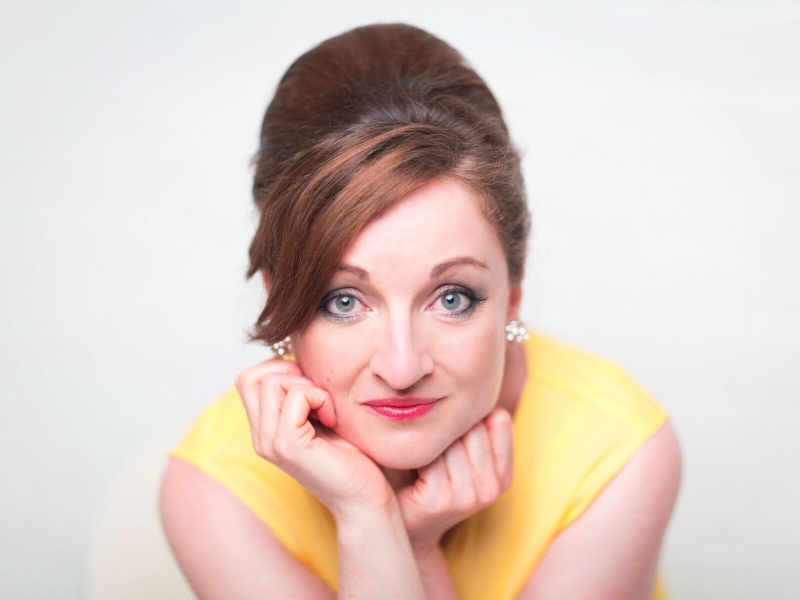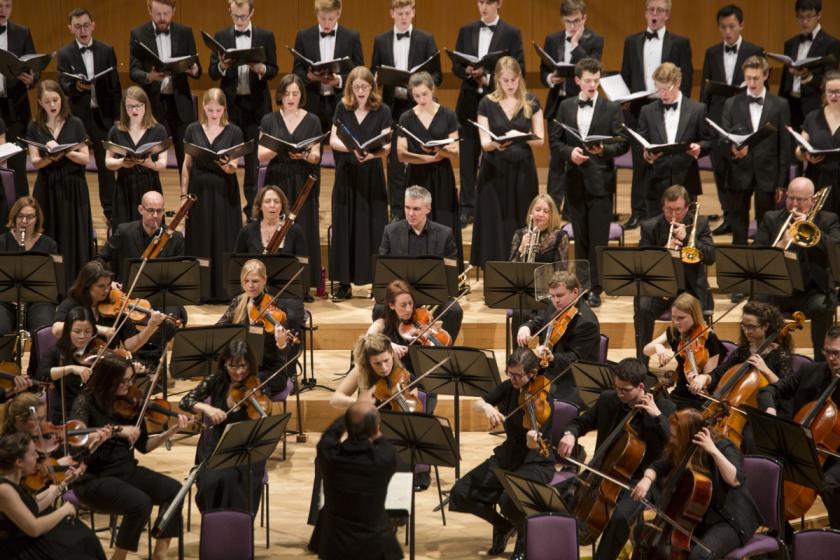It began in semi-darkness. Appropriate for Arvo Pärt, perhaps – after all, Manchester Camerata have played his music in Manchester Cathedral to great atmospheric effect in the past. But the Choir of Clare College Cambridge, conducted by Graham Ross, delivered his Da pacem Domine in a hall where it seemed as if the lights had failed … not quite the same thing.
They sang the brief, four-part, a cappella piece fairly accurately and, for the most part, confidently, but the 26 young singers could not create the spark, or the richness of tone, that might have brought its holy minimalism to real life.
And they were already walking off the platform when the lights came on. It was almost like a pre-concert event, for the next procedure was the arrival (applauded) of the Camerata musicians to play their Mozart symphony.
Gábor Takács-Nagy likes to talk to audiences before conducting his orchestra, and he explained his theory of the story behind the opening of Mozart’s Symphony no. 36 (the ‘Linz’). Wolfgang and Constanze have just tried, and failed, to forge a good relationship with daddy Leopold in Salzburg – they arrive with relief at Linz, and the slow introduction depicts grumpy father, beautiful sweetheart, sad goodbye and then … on to a jolly time in pleasant surroundings.
It’s a Romantic notion, but Takács-Nagy is a bit of a Romantic at heart. The symphony is a serenade in all but name, with a quasi-operatic introduction, and he loves its delicate emotions and its liveliness. The Camerata – a bit stronger in numbers than the ensemble we meet in smaller venues, with five celli and three bassi, and led by Caroline Pether – sounded slightly ragged in ensemble in the slower sections, but they picked up on their conductor’s intimations in the ‘sensibility’ style of the second movement, and the presto finale gave them no problems. He was audibly singing along to the music much of the time, and when he tried to introduce some variety of articulation to the minuet and trio it wasn’t entirely clear what they had been expecting. That’s where spontaneity can let you down, especially with players who aren’t regularly accustomed to it.
 The meat of the evening was Mozart’s Requiem, with soloists Ailish Tynan (pictured left), Anna Harvey, Nicholas Mulroy and Peter Harvey (a well-balanced team) and the Clare College Choir. Takács-Nagy was going for drama in the work, asking his chorus for growing and shrinking weight of tone here and there, to which they responded well, although too small in number to create the big impact he may have hoped for at its peaks. But pace was everything: his vigorous Kyrie demanded mercy rather than pleading for it, with excellent clarity in the choral counterpoint.
The meat of the evening was Mozart’s Requiem, with soloists Ailish Tynan (pictured left), Anna Harvey, Nicholas Mulroy and Peter Harvey (a well-balanced team) and the Clare College Choir. Takács-Nagy was going for drama in the work, asking his chorus for growing and shrinking weight of tone here and there, to which they responded well, although too small in number to create the big impact he may have hoped for at its peaks. But pace was everything: his vigorous Kyrie demanded mercy rather than pleading for it, with excellent clarity in the choral counterpoint.
Partly as a result of that, the Dies Irae – also fast, and intently furious – had less impact than might have been. But the Tuba mirum revealed the sterling qualities of the solo quartet, even if the style was operatic more in the manner of The Magic Flute than La Clemenza di Tito, and the Rex tremendae brought vehemence and plaintiveness in equal measure from the chorus (as did the Confutatis later).
The four soli were wondrous in the Recordare – Ailish Tynan lyrical and soaring over the texture, Nicholas Mulroy passionate and powerful, and Anna Harvey and Peter Harvey adding well judged contributions – and the choral singing in the Lacrimosa was one of the best parts of the whole performance.
Domine Jesus was particularly fast for an Andante, as if Takács-Nagy thought the solution for most issues was to speed along, and the first run at the Osanna fugue (after the Sanctus) left the chorus lagging a little behind the beat – but the second go was much better.
Once arrived in Süssmayr territory, it was as if the conductor could not quite lavish the expressive qualities on the music that he had found in that of his beloved Mozart (few conductors can), but the Benedictus and Agnus Dei achieved the requisite degree of liturgical piety and were warmly sung and played. And finally back with the master, the Lux aeterna and Cum sanctis fugue were confident, lively and brought an impressive and much appreciated ending to the work.













Add comment